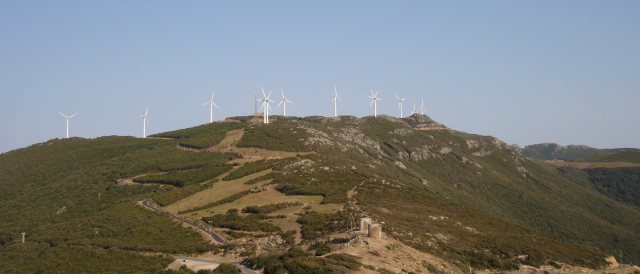In his previous post, Craig Morris talks about how the renewable surcharge will drop for the first time in 2015. But there is another interesting aspect to the issue. Germany allows transmission grid operators (TSOs), rather than a government entity, to calculate the charge. For the EU, that distinction is the difference between legal and illegal.

Wind Power in France: While the legal differences are rather subtle, the European Court of Justice ruled against the French Feed-In Tariff while allowing the more market-based German one. (Photo by Pinpin, CC BY-SA 3.0)
Last year, the European Court of Justice (ECJ) handed down a ruling that sent a chill through the German renewable sector. It found (PDF) that French feed-in tariffs for wind power constitute state aid.
French anti-wind lobby group Vent de Cholère had brought forth the charges in an attempt to stop wind farms from being built in their country. But there was a reason why the German renewables camp did not have to worry. As German legal expert (and blogger) Karl-Friedrich Lenz pointed out at the time, the court itself made a distinction between the French situation and a previous ruling pertaining to Germany’s Feed-in Act of 1991, the predecessor to the Renewable Energy Act of 2000.
More pertinently, the ECJ also made reference to a recent ruling pertaining to Belgium. There, the policy had specified that the entities managing the feed-in tariff account were “private undertakings […] Not appointed by the Member State concerned to manage a State resource.” The money was therefore “not at any time under public control.”
Here, we see a clear similarity with German policy. The German government does not collect revenue from the renewables surcharge or sell the power or specify the level of the surcharge, nor does any government agency. (Someone should tell Der Spiegel, which recently got the story wrong by explaining that “the German governmentis reducing the surcharge…”) These tasks are left up to the TSOs, which are not owned by the German government (though one of them is a full subsidiary of the Dutch government, and other governments have holdings).
In contrast, the court found that the French policy is “attributable to the French state.”
“… the sums intended to offset the additional costs arising from the obligation to purchase imposed on the undertakings are… entrusted to a public body, the CDC. Furthermore, the amount of the charge imposed on each final consumer of electricity is determined annually by ministerial order.”
For legal experts, the court’s ruling on French policy was not surprising. In 2006, it came to a similar finding pertaining to Austria (PDF), where the state had control of these revenue flows.
It follows that all Austria (and France) had to do to comply with EU policy was allow non-governmental bodies to handle the revenue and set the surcharge. The ECJ did not rule against feed-in tariffs per se. Indeed, this summer the court explicitly ruled in favor of them – against the push from the European Commission to phase out feed-in tariffs.
For me, the meticulousness of German lawmakers in formulating the Renewable Energy Act, which specifies feed-in tariffs, is impressive. Obviously, the politicians behind the policy at its various stages since 2000 did their homework. But there is something else at work here as well – the general openness of the German government in every coalition since 2000 to leave as many decisions as possible up to market players. As I previously pointed out, the Anglo world mistakes Germany for a statist country. In reality, the German government cannot directly influence the way the country’s four TSOs, none of which are owned by the state, tallies the surcharge. We therefore end up with a situation in which the deficit of 2.2 billion euros in 2013 increased the surcharge by 0.96 cents for this year, whereas the current 1.4 billion euro surplus only decreases the surcharge by 0.07 cents.
Craig Morris (@PPchef) is the lead author of German Energy Transition. He directs Petite Planète and writes every workday for Renewables International.